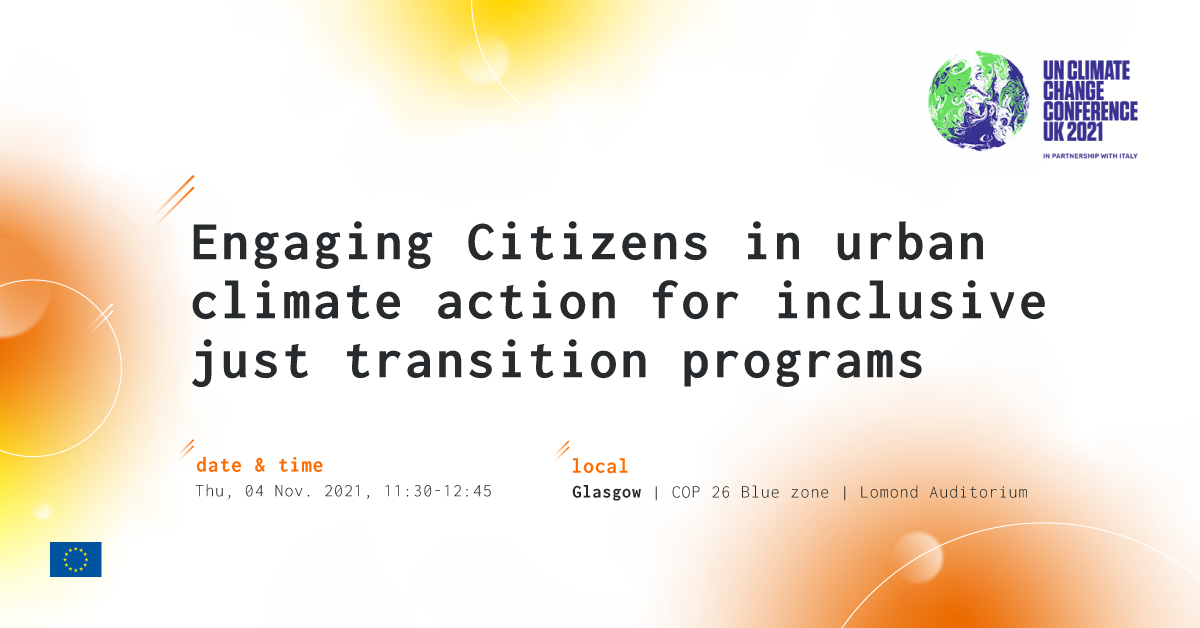
DIALOGUES will be at the COP26 side session ‘Engaging citizens in urban climate action for inclusive just transition programs’.
The event will look at five different experiences of how to engage citizens in climate action that have in common the understanding that only strong co-productive action of governments and citizens will make the ecological conversion happen. The radical changes we have before us need strong forces that act “from below” and involve social groups that in the past have received little attention in the dominant technocratic approach from above.
What started as a Covid restraint, no COP in 2020, became a real opportunity for deep social engagement of people, organizations, and municipalities in Israel to make the climate topic their own. The Israel Climate Coalition of over 80 organizations, set an ambitious goal – to reach all sectors and regions of society at the local level. 14 regional climate conferences took place that addressed local environmental and social topics and put them in the broader context of the climate crisis to both validate the local causes and empower the national Climate movement.
Rony Erez, Co-Director of the Heschel Center for Sustainability and a member of the Israeli Climate Coalition, Tel Aviv
GenderCC’s project ‘Gender into Urban Climate Change Initiative’ has brought together women’s organisations from four countries and 14 pilot cities to assess urban climate action from a gender perspective and develop recommendations for gender-responsive policies. We present findings and lessons learned and launch a guidebook on GenderCC’s gender assessment approach.
Gotelind Alber, GenderCC-Women for Climate Justice, Board Member, Berlin
We are living through a fundamental shift from a fossil energy system and energy culture to one based on renewables. This transition entails dramatic changes in the way people use electricity, heat their homes, and move around. The social changes promise to be more revolutionary than the technological ones, an insight which the European Commission has taken up pushing the concept of energy citizenship. Three EU flagship research projects, Greta, Enclude e DIALOGUES are asking how to engage citizens who up to now have no agency in the energy transition, vulnerable groups, often threatened by energy poverty or health risks, elderly, single mothers, and women in general. We will look at Citizens Action Labs which DIALOGUES uses for these social groups to find their own voice in the energy transition.
Karl-Ludwig Schibel, Senior fellow Climate Alliance of European Cities, Città di Castello, Italy
Glasgow is using a placed-based approach to deliver a variety of benefits for people and nature. With their open space strategy and using nature-based solutions Glasgow is seeking to link people and place to encourage ownership and stewardship – particularly driving entrepreneurship amongst the underprivileged. Exploring ways of dealing with management of public space in a period of austerity in public spending, for example by including local stakeholders, is another focus area. Glasgow is supported by Connecting Nature project, innovating with nature-based solutions to co-create climate resilient urban communities by connecting cities, academics, & businesses, funded via the European Union through Horizon 2020 programme.
Gillian Dick, Spatial Planning Manager, Glasgow City Council
Energy poverty – or vulnerability – is a critical factor for a fair energy transition. It remains at high levels in Europe due to increasing energy costs and slow progress on energy efficiency improvements. Ghent has been one of the cities in the forefront of empowering vulnerable families in their energy-efficiency refurbishment. In recent years the city has created a lot of space for initiatives coming from citizens, organizations, and companies for reducing energy consumption and making energy production more sustainable.
Tine Heyse, president of the board of Climate Alliance of European Cities and Mayor for Environment, Climate, Energy and North-South, City of Ghent, Belgium
In collaboration with the projects:


There is no registration necessary! See you there!
DIALOGUES Project may use cookies to memorise the data you use when logging to DIALOGUES website, gather statistics to optimise the functionality of the website and to carry out marketing campaigns based on your interests.
required cookies They allow you to browse the website and use its applications as well as to access secure areas of the website. Without these cookies, the services you have requested cannot be provided.
functional cookies These cookies are necessary to allow the main functionality of the website and they are activated automatically when you enter this website. They store user preferences for site usage so that you do not need to reconfigure the site each time you visit it.
advertising cookies These cookies direct advertising according to the interests of each user so as to direct advertising campaigns, taking into account the tastes of users, and they also limit the number of times you see the ad, helping to measure the effectiveness of advertising and the success of the website organisation.

